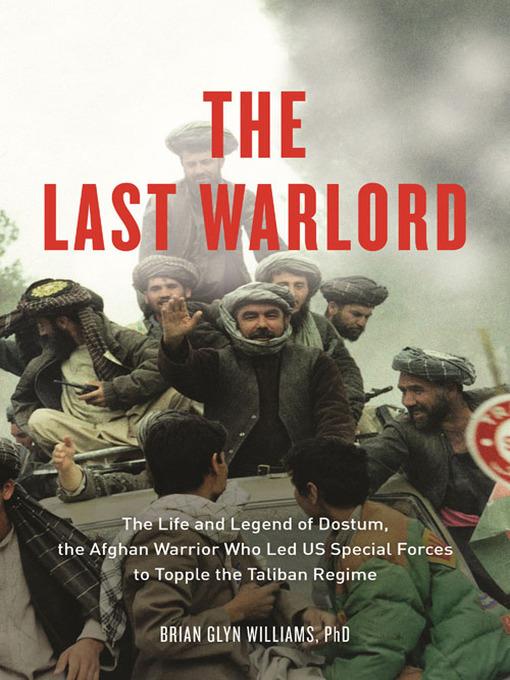
The Last Warlord
The Life and Legend of Dostum, the Afghan Warrior Who Led US Special Forces to Topple the Taliban Re
فرمت کتاب
ebook
تاریخ انتشار
2013
نویسنده
Brian Glyn Williamsناشر
Chicago Review Pressشابک
9781613748039
کتاب های مرتبط
- اطلاعات
- نقد و بررسی
- دیدگاه کاربران
نقد و بررسی

July 22, 2013
Afghanistan is a challenging place to do research, and the dangers inherent in writing a biography of a mercurial warlord—while using as one’s primary source an extended interview with the man himself—are obvious. But Williams, who worked for the CIA in Afghanistan, is not your typical history professor, and his knowledge of and access to Uzbek Afghan culture allows him to craft a credible and captivating narrative. He admits that his account “doubtless contains stories that are half legend,” and while his book might not pass muster in an academic seminar, it does have the makings of a Hollywood biopic. Dostum, a larger-than-life figure in command of an ethnic militia in Northern Afghanistan, has been called the most powerful warlord in history, and is alternately revered as a pragmatic modernizer and champion of women’s rights who did more than anyone else to bring down the Taliban, and reviled as a sadist who slaughters his enemies by the thousands and frightens grown men to death with his laugh. Williams takes the hagiographic route, but Dostum’s story of never-ending battles, assassination attempts, and alliances forming and breaking in the blink of an eye is fascinating, whether he is regarded as hero or villain. 16-page color photo insert. Agent: Faye Swetky and D.J. Herda, Swetky Agency.

May 15, 2013
The turbulent history of Afghanistan and its most powerful and influential army general through the eyes of an American historian. Dubbing it one of his life's greatest challenges, Williams (Afghanistan Declassified: A Guide to America's Longest War, 2011), a former CIA tracker and Islamic history instructor, traveled extensively throughout central Asia to probe the region's historic bounty and, moreover, to discover the intriguing man behind the Taliban's demise, Gen. Abdul Rashid Dostum, Uzbek commander of the Northern Alliance opposition. Williams easily appreciated an area uniquely accommodating of both modern Western and traditional Afghan customs. Undeterred by its characteristic sand, heat and whipping windstorms, he writes excitedly of the 2003 and 2005 visits to Mazar-i-Sharif, where Dostum's imperial compound awaited him and where questions about the warlord's refuted reputation as either a ruthless drug baron or a respected leader of the Afghan people could finally be answered. Somewhat unexpectedly, though with aplomb, Williams charts Dostum's scrappy, "primitive" origins from army soldier to military warlord alongside the expansive history of Afghanistan, through Taliban fundamentalism, the assassination of military leader Ahmad Massoud, 9/11 and the play-by-play details of the warlord's American-assisted victory. As expected, the politics of war figures heavily throughout the book, as does Williams' version of Dostum's crucial role in redefining the area under his refined regime. Still, while the minute details of Afghanistan's vast history are mostly engaging, they absorb most of the book's promising exclusive-with-a-warlord punch, leaving the author's brief time interviewing Dostum and touring the grounds almost as an afterthought. More historic chronicle than biographic expose--will appeal mostly to academics and those with an intense interest in the collapse of the Taliban.
COPYRIGHT(2013) Kirkus Reviews, ALL RIGHTS RESERVED.

October 1, 2013
Contemporary Afghanistan is characterized by several ethnic, ideological, religious, and geographic divisions. Over the past 30 years, several strongmen or "warlords" have played important roles in shaping Afghanistan's destiny. This book is a highly readable account of the meteoric rise of Gen. Abdul Rashid Dostum, an Afghan of Uzbek ethnicity and one of the most colorful and powerful "warlords" to have emerged in recent decades. Williams (Islamic history, Univ. of Massachusetts, Dartmouth) chronicles Dostum's central role in the various iterations of Afghan crisis from the late 1970s to the present. Through extensive interviews with the warlord and his family, as well as with various local chieftains, Muslim clerics, women's rights activists, and even Taliban prisoners, Williams provides a fascinating description of Dostum's political maneuvering and the alliances he formed through the years. In some ways, Dostum has been a political survivor, aligning himself first against the Afghan Mujahedin fighting the Soviet army, then siding with them in what was later called the "Northern Alliance" to fight against the Taliban, both before and after the U.S. invasion of Afghanistan. VERDICT This is a valuable and informative book for inquiring readers of all levels, including journalists and policymakers.--NE
Copyright 2013 Library Journal, LLC Used with permission.

























دیدگاه کاربران